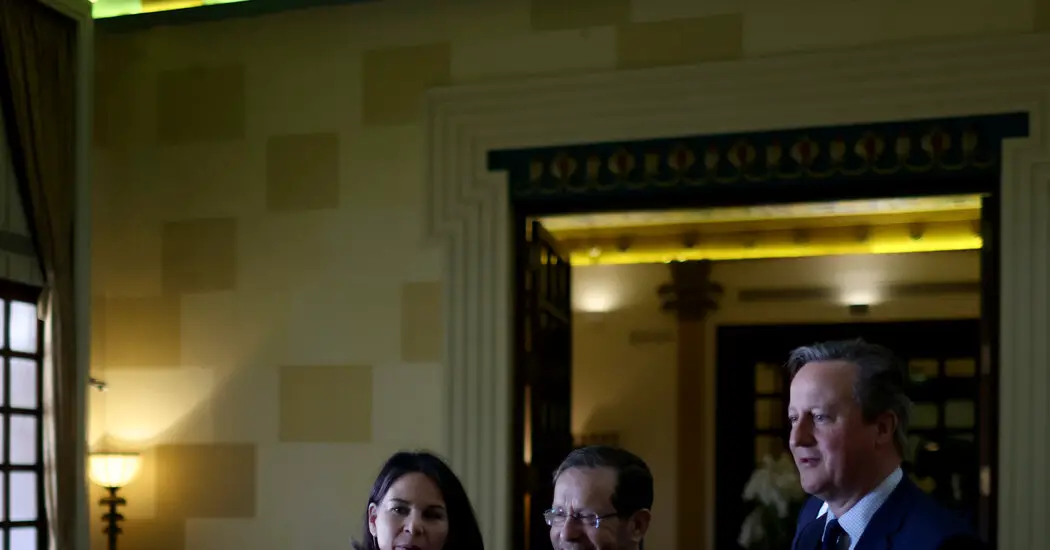
An Israeli response to Iran’s attack seems inevitable
Top European diplomats traveled to Israel yesterday to make one more plea for the country to show restraint in response to Iran’s aerial attack over the weekend. But David Cameron, Britain’s foreign secretary, said that a reprisal seemed inevitable.
“It is clear that the Israelis are making a decision to act,” Cameron told the BBC. “We hope that they do so in a way that does as little to escalate this as possible.”
Benjamin Netanyahu, Israel’s prime minister, signaled that he plans to move forward with a response, despite pressure from the U.S., Britain, Germany and other countries to de-escalate the situation. After meeting with the diplomats, Netanyahu thanked Israel’s allies for their “support in words and support in actions,” according to his office. But, he added: “I want to make it clear — we will make our own decisions.”
Israeli officials are said to be considering a range of options, including a direct strike on Iran, a strike on an Iranian target in another country, a cyberattack and assassinations. They want to send a clear message to Tehran while not inciting a major escalation.
Israeli detention: Gazans released after being detained by Israel described graphic scenes of physical abuse, according to a report released by UNRWA, the U.N. agency for Palestinian refugees.
Lebanon: Hezbollah, an Iran-backed group, took responsibility for an attack in northern Israel that the Israeli military said had injured 14 soldiers.
Russia hit Ukraine as the U.S. moves on aid
At least 17 people were killed yesterday and dozens more were reported injured when three Russian missiles struck Chernihiv, north of Kyiv, Ukrainian officials said. Volodymyr Zelensky, Ukraine’s president, said the death toll might rise and blamed a lack of air defenses for the loss of life.
“This would not have happened if Ukraine had received enough air defense equipment and if the world’s determination to counter Russian terror was also sufficient,” he said.
More U.S. aid may be on the horizon. Mike Johnson, the speaker of the House of Representatives, said yesterday that he expected a vote on Saturday on the long-stalled package of $60 billion in aid to Ukraine and on other foreign aid.
Explosions were also reported yesterday at a key Russian base in the Moscow-occupied Crimean Peninsula, in what seemed to be a Ukrainian attack. Ukrainian officials did not comment on the apparent attack, which took place in Dzhankoi, a hub for Russian roads and railways, but Russian bloggers affiliated with the Kremlin reported that Ukrainian missiles had struck around the base.
Context: Ukraine has been trying to target Russian weapons at their source, in part because U.S. military aid has been largely suspended in the face of Republican opposition. Ukraine is also running out of the ammunition it needs for its air defense systems, which it uses to fend off a near-daily volley of missiles.
The frontline: Thousands of foreign fighters signed up to fight with Ukraine. The Times spent four days alongside some of them.
Heavy rains battered the U.A.E. and Oman
Record levels of rainfall brought cities across the United Arab Emirates and Oman to a standstill. At least 19 people were killed in Oman.
The rain led to flights being diverted from Dubai, as videos showed planes leaving waves in their wake as they taxied down flooded runways. In Muscat, Oman’s capital, flash flooding turned streets into raging rivers.
Experts said the extreme deluge had probably been the result of a regular, rainy weather system, supercharged by climate change. The U.A.E. experienced its largest rainfall event in 75 years on Tuesday, the government said.
Clerics in Indonesia are pushing for “Green Islam,” issuing fatwas, or edicts, to fight climate change.
Some work to educate people, showing how environmentalism is part of the Quran. Others are making physical changes, like adding solar panels and water-recycling systems to Southeast Asia’s largest mosque.
CONVERSATION STARTERS
A new U.S.-China podcast
Jane Perlez, a Pulitzer Prize-winning reporter who served as The Times Beijing bureau chief, has spent much of her career writing about China. She covered the rise of Xi Jinping, China’s leader, and how the U.S. has struggled to respond to China’s growth.
Now, Jane is exploring the origins of the rivalry and conflict between the two superpowers in her new podcast, “Face-Off: The U.S. vs. China.” In the eight-episode series, Jane and her co-host, Rana Mitter, a historian at Harvard, talk to diplomats, spies and even Yo-Yo Ma.
They focus on key parts of the unraveling relationship — including near-misses between U.S. spy planes and Chinese fighter jets and Apple’s compromises as it courts China — to dig into how the two countries, which used to be friends, have become adversaries.
“We try to provide some rationality and some ways to think about going forward without the hysteria,” Jane told me. “We are trying to see China for what it is, which is a challenge, but it’s something that the U.S. is immensely capable of dealing with.”






